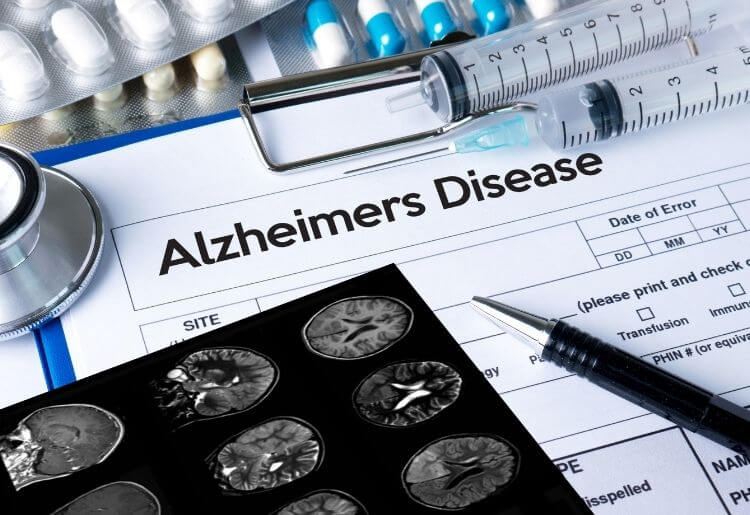Fortunately, there are treatments that can slow the progress of the disease and control its symptoms. This makes early detection crucial, and you can take an at-home DNA test to determine your risk of developing it. But it’s also important to understand the signs and symptoms so you know what to watch out for, and in this article, we’ve got them covered.
What is Alzheimer’s Disease?
Alzheimer’s is a form of dementia that affects your brain, and thus your memory, thinking ability, decision-making processes, and behavior. It is a progressive disease, which means its symptoms will become worse over time. The disease mainly affects those over 65 years of age, but it can also affect people in their 30s or 40s, and more than 300,000 Americans under 65 live with this condition.
Experts are not sure what triggers the disease, but once it begins there is a buildup of plaque in the brain that damages its memory centers. As the disease progresses, it damages more areas of the brain and causes more symptoms.
10 Signs and Symptoms of Early-Onset Alzheimer’s Disease
The following symptoms are common in both early-onset and late-onset Alzheimer’s. If you notice any in yourself or in a loved one, consult a doctor. With early detection, you can explore treatments that provide relief from the symptoms and slow the progress of the disease.
1. Memory loss that starts to disrupt your daily life
The most common sign of early Alzheimer’s is having increasing difficulty remembering things, especially newly learned information. It can also manifest itself as losing track of important dates or events, and having to rely more and more on memory aids such as lists, reminders, or electronic devices to keep track of things.
Another common early-stage symptom is experiencing increasing memory lapses. For example, while speaking, you may struggle to find the right word or forget the names of friends and associates. Other examples of Alzheimer’s-related memory loss and how they differ from normal, age-related forgetfulness, are explained on the website of the National Institute on Aging.
2. Difficulty planning or solving everyday problems
Another change that can indicate Alzheimer’s disease is having trouble developing or following plans or multi-step tasks, such as preparing a familiar recipe or keeping track of bills. People with early-stage Alzheimer’s also often have difficulty working with numbers in general, so common tasks like balancing a checkbook can become problematic.
3. Difficulty completing familiar tasks
Some people with early-stage Alzheimer’s find it increasingly difficult to complete everyday tasks, such as drawing up a shopping list, or even finding the grocery store, despite having been there many times. They may find themselves unable to remember things they knew well before, such as the rules of a favorite game.
This can be compounded by an increasing problem with concentration and an inability to stay focused. Tasks that require problem-solving and critical thought may take longer to complete and become frustrating. This inability to concentrate can become a safety concern if it results in becoming lost while walking or driving on a commonly traveled route.
4. Difficulty keeping track of time or place
People living with Alzheimer's can lose track of what day of the week it is. They can forget about important dates or appointments, and even forget what month or season it is. Determining the passage of time becomes problematic, and they may have trouble understanding something if it is not happening immediately.
Planning ahead for future events also becomes difficult because when the event rolls around, they may have forgotten about it.

5. Vision problems - not understanding visual images and spatial relationships
Some vision problems can be a sign of Alzheimer’s. This can first manifest as having trouble reading but can escalate to problems with depth perception and judging distance, or being unable to accurately determine color and contrast. This is a significant issue if the person is driving, but it can also affect balance and one’s ability to walk and navigate stairs safely.
6. Can’t find the right words when speaking or writing
People living with Alzheimer's often find themselves pausing during a conversation because they can’t remember the name of a common object. This can extend to being temporarily unable to remember the names of old friends or family members.
This is embarrassing, so they may become reluctant to engage in conversations because they often lose their train of thought. Repetitive conversations can result, as they tell the same story over and over to people who have already heard it.
7. Misplacing things and losing the ability to retrace steps
People with Alzheimer’s often misplace things, leaving them in unusual places that they then cannot remember later. And when they realize that they’ve lost these things, they find themselves unable to retrace their steps and locate them. If this happens often enough, the person can become frustrated or even begin to think that other people are stealing these things or hiding them from them.
8. Poor judgment and difficulty making decisions
As the disease develops, people with Alzheimer’s may experience changes in their ability to make decisions or use proper judgment. This can take many forms, such as failing to pay attention to personal grooming or forgetting to bathe and wear clean clothing. But it can also extend to financial decisions, where poor judgment can be disastrous, such as suddenly deciding to give all their money away, or falling for telemarketing scams.
9. Withdrawing from work or social activities
Because their memory lapses make conversations more difficult, people with Alzheimer’s often become reclusive, withdrawing from their normal work projects, hobbies, and social activities. They may lose interest in their favorite sports, because they can’t follow the teams anymore, or avoid social gatherings that used to be the high point of their week.
10. Changes in mood and personality
Finally, as their Alzheimer’s progresses and becomes worse, people trying to cope with it can experience mood and personality changes that can be quite disturbing. They may become easily confused and suspicious of others, which can lead to depression and a near-constant state of anxiety and fearfulness.
Is Alzheimer’s a Hereditary Disease That Runs in the Family?
The answer is sometimes, but not always. Research has shown that you’re more at risk for Alzheimer’s if you have a parent or sibling who had the disease. If you have more than one close relative with Alzheimer’s, you’re even more at risk.
But—and this is important—before you start calling all your relatives to test for a genetic link to any health condition, it’s important to understand the word “risk.” Having relatives with Alzheimer’s, or with any particular disease, doesn’t mean that you will also definitely get it, only that your risk is higher. And even if you are identified as having what’s called a “risk gene,” it still only means your chance of developing the disease is increased—it does not guarantee that it will happen.
This is why doctors do not recommend genetic testing for the general population: people tend to misunderstand the results and assume that if a DNA test is positive for a risk gene, they will get the disease. Furthermore, the Alzheimer’s Association says that the at-home tests can have false-positive results, and they stress that home DNA tests should not be used as a substitute for a diagnostic examination by a skilled doctor.
Home DNA Tests and Alzheimer’s
If you want to be proactive about your health and you’re planning to use an at-home DNA testing kit, you should be aware that there are two types of disease-related genes: deterministic genes and risk genes. Deterministic genes directly cause disease but account for less than 1% of Alzheimer’s cases worldwide.
Both Futura Genetics and 23andMe offer at-home DNA testing kits which test for the risk gene related to Alzheimer’s disease. If you choose to take these home tests, please remember that they cannot tell you whether you are going to get Alzheimer’s, merely that your risk of developing the disease may be higher if your DNA profile contains the APOE-e4 gene. There are also some additional things to consider before taking an at-home DNA test, including varying privacy rules across providers.
Conclusion
Alzheimer’s disease is a condition that affects over 6.5 million Americans. If you or someone you love regularly experiences any of the symptoms on our list in a way that is impacting everyday life, contact your healthcare provider. If you have a family history of Alzheimer’s, your doctor may recommend that you work with a genetic counselor.
The Alzheimer’s Association can provide information about the disease and help you find a support group or clinical trials to participate in. New treatments are being developed that can slow the progress of symptoms and improve the quality of life for those with the disease.
Juliette Siegfried is a biomedical writer, editor, and translator with over 30 years of experience. After working as a health communications specialist for the National Institutes of Health in Bethesda, Maryland, and its contractors, Juliette established ServingMed.com, a medical communications business for hospitals, universities, research foundations, and individual healthcare professionals.



